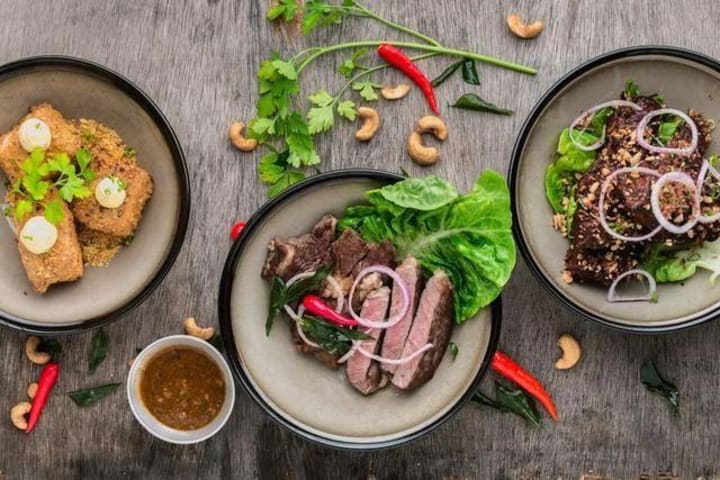
If the foodie next to you suddenly does not touch meat, oil, and salt, TA may be a "light diet".
Many people firmly believe in the benefits of eating lightly, but some belief to the extreme that the so-called "light" is not to eat meat and oil, only eat vegetarian food, adhere to a few years, not only not improve health but fell ill.
What is "light" in the end
When it comes to healthy eating, many people naturally think of "less meat" or "no meat".
Especially people who are usually used to a greasy diet, when they start eating light for health, they may also go to extremes: often a bowl of porridge with small vegetables, white rice with fried vegetables, or white noodles with vegetables cooked ......
In fact, in the eyes of doctors and nutrition experts, this is a very wrong approach, not only is not conducive to balanced nutrition but also leads to a decline in physical fitness, making people more vulnerable to disease.
Light is not the same as tasteless, oil-free, single, it is relative to the "fatty, sweet and thick taste", light refers to less oil, light refers to less salt, should be a comprehensive, nutritionally balanced ingredients, animal food, cooking oil and salt limit within a reasonable range, avoid excessive use of spicy condiments.
At the same time, healthy cooking methods best reflect the true taste of food and preserve its nutrients to the maximum.
A scientific light diet helps maintain health and is suitable for most people, especially for patients with high blood lipids, obesity, gastrointestinal diseases, cardiovascular and cerebrovascular diseases, and after surgery.
Eating too lightly is prone to illness
People who eat less meat or no meat as a light diet are not only unhealthy but also more prone to illness.
Vegetarian food contains very little protein, except for beans, which are rich in protein. Chicken, duck, pig, cow, sheep, fish, shrimp meat, etc., are rich in high-quality protein, lipids, fat-soluble vitamins, B vitamins, etc. The human body's growth, development, and metabolism cannot be separated from these nutrients.
Not eating meat, and insufficient intake of eggs and soy products can cause protein deficiency, causing a decrease in immunity and poor skin elasticity.
Inadequate intake of fats and oils, especially essential fatty acid deficiency, can cause fat-soluble vitamins A, D, and E deficiency, dry eye disease, osteoporosis, etc.

The nutrients most likely to be deficient in people who do not eat meat are protein, vitamin B12, and n-3 polyunsaturated fatty acids:
1
Protein deficiency
An unreasonable vegetarian diet can lead to protein deficiency, which can cause a decrease in immunity and malnutrition, which is instead detrimental to the control of chronic diseases. In addition, it can lead to poor skin elasticity and make people look emaciated.
2
Vitamin B12 deficiency
Vitamin B12 deficiency in the human body will lead to fatigue, poor muscle function, and other symptoms, resulting in tongue inflammation, red blood cell reduction, reduced heart function, reduced fertility, etc. If not corrected in time, it will cause irreversible damage, especially to the brain and the entire nervous system is the most harmful.
3
n-3 polyunsaturated fatty acid deficiency
n-3 polyunsaturated fatty acids, on the other hand, are closely related to brain development, cardiovascular system diseases, type 2 diabetes, depression, and many other non-communicable epidemics.
If you have been eating too light for a long time, in addition to the above three nutrients, vitamin D, calcium, iron, zinc, and other nutrients are also prone to deficiency and need to pay attention to supplementation.
Light diet, one more, three less, one avoid
In fact, "one more, three less, one taboo" is the essence of a light diet, not only to present the original flavor of food but also to reduce the loss of food nutrients.
One more: food diversity, balanced nutrition
Food diversity refers to the diversity of ingredients, especially the diversity of natural ingredients.
Each person should consume more than 12 kinds of food per day, more than 25 kinds per week.
The average number of food varieties of cereals, potatoes, and legumes is more than 3 per day and more than 5 per week.
The average number of food varieties of vegetables and fruits is more than 4 per day and more than 10 per week
The average number of food varieties of fish, poultry, meat, and eggs is more than 3 per day and more than 5 per week
The average number of food varieties of milk, soybeans, and nuts is 2 or more per day and 5 or more per week.
The average daily intake of cereals and potatoes is 250~400 grams, 120~200 grams of animal food (including 40~75 grams of livestock and poultry meat, 40~75 grams of fish and shrimp, 40~50 grams of eggs), and 300~500 grams of vegetables.

To achieve food diversity, overall attention should be paid to the coarse and fine, meat and vegetables, and color matching. This can be done from three points.
1. choose small portions
Smaller portions of the same food are good for enriching the variety of dishes and thus the source of nutrients.
2. Interchangeable foods of the same type
For example, the same staple food, today rice, tomorrow mixed rice, the next day whole wheat bread, etc., to help enrich the variety of food over some time.
3. Learn to match ingredients
The staple food is coarse and fine, of which about 1/4 to 1/3 of coarse grains is good, you can also eat coarse grains twice a week, using potatoes, sweet potatoes, etc. to replace part of the staple food. Vegetarian and non-vegetarian dishes, roughly 3~4 teals of vegetables corresponding to 1 teal of meat.
For food color matching, for example, the ravel porridge, you can put a variety of grains; mixed vegetables can put a variety of vegetables "stew".
Meat is best cooked with low-fat, high-fiber roots and algae ingredients, such as lotus root and ribs soup, not only to relieve grease, but also to increase the fresh taste.
Three less: less oil, less salt, less sugar
Less oil: mix and use in small amounts
According to the dietary guidelines, the recommended daily intake of oil for cooking is 25-30 grams per person. Control the use of oil, when cooking on your own, start by adjusting the amount and type.
For example, if you are stewing pork ribs, you can stew them directly after blanching them, so there is no need to stir-fry them with oil.
The variety of oil, tea seed oil, olive oil, and soybean oil is best to often change the food.
Reduce the intake of high-oil dishes and fried foods.
It should be reminded that fatty meat is high in fat, lean meat should be the main choice, less pittance. Compared with animal meat, fish, poultry and other white meat have relatively low-fat content and high unsaturated fatty acid content. When eating chicken and duck meat, it is best to remove the skin, otherwise, it will increase fat intake.
Less salt: no more than one cap a day
The recommended daily salt intake for adults is no more than 6 grams, about the amount of a bottle cap. You may wish to try the following methods when cooking.
Using a limited number of spoons.
Enhancing the flavor of dishes with vinegar, lemon juice, spices, etc.
Adding salt when the dish or soup is almost ready to be cooked, both to ensure flavor and to reduce the amount of salt used.
If you use chicken essence, soy sauce, and other seasonings, try not to add more salt to avoid salt overload. Pay attention to reducing the intake of high-salt foods, such as cookies and instant noodles.
Less sugar: stay away from sweets
The daily intake of added sugar is recommended to be controlled at less than 50 grams, preferably no more than 25 grams. Added sugars are sugars artificially added to food with sweet characteristics, commonly sucrose, fructose, glucose, etc.
In addition to reducing the amount of white sugar consumption for daily stir-fry and stew, you should also reduce the intake or do not consume desserts and drinks rich in fructose, glucose, and fructose syrup.
A taboo: eat less spicy, steamed and stewed-based
Properly eating spicily can promote appetite, but too spicy easily stimulate the digestive system, causing mouth ulcers, constipation, and other problems so should be avoided as far as possible.
A light diet is inseparable from a reasonable cooking method, and it is recommended to give priority to quick frying, steaming, stewing and white-burning, which can lock in the original taste and nutrition of food to the maximum.
People's sense of taste is gradually developed, you can first set the immediate goal of less salt, less oil, and less sugar, and gradually in the daily diet, and eventually change the cooking and eating habits to form a light taste.






Comments
There are no comments for this story
Be the first to respond and start the conversation.